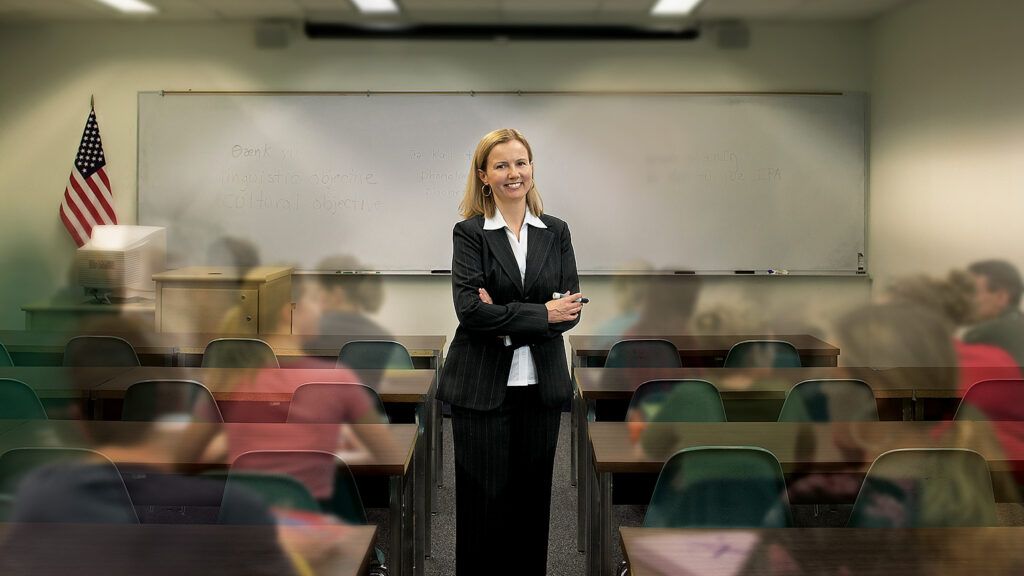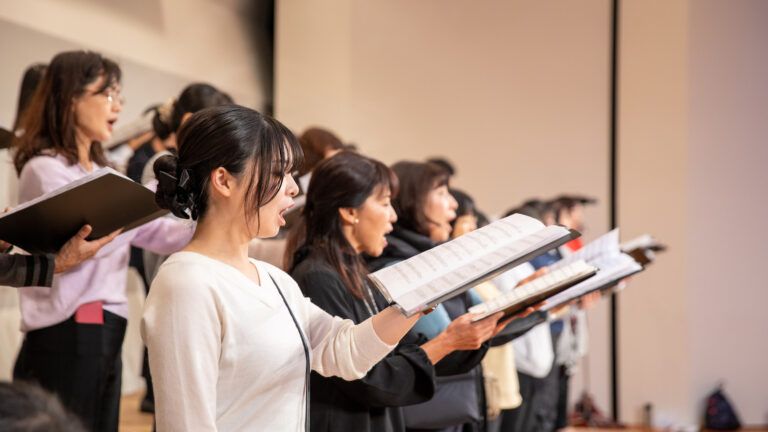6:04 p.m. I settled into my seat at the front of the classroom and looked at the roster. Thirty students. I counted just 10 in their seats. “Anderson,” I said. No response. “Applegate.” Silence.
I wasn’t new to teaching, but I was new to this university, and to the students it served—adults with families and jobs, single moms, ex-military, all of whom wanted to become teachers.
I stood up and printed the course title across the whiteboard in black marker: Teaching Students Who Speak English as a Second Language (ESL)—a required course for education majors.
The heavy door at the back of the room slammed with a thud. I turned around. A middle-aged man with faded tattoos on his forearms, tattered jeans and a five o’clock shadow swaggered in. “What’s your name?” I asked.
“Mike,” he said gruffly.
After Mike came Rose a few minutes later, then Felix a minute later, followed by Melissa, Marta and Arthur. No apologies, no explanations. “Punctuality is expected,” I finally announced.
“Whatever,” someone muttered. In the harsh glare of the room’s fluorescent lights, I felt so exposed. Keep it together, Joyce, I told myself, and moved on to the syllabus.
I started to describe the papers and research projects. Perhaps because I was nervous, I ran through the material more quickly than I should have.
“Wait,” interrupted Cassie, a 30-something with freckles and curly red hair. “I didn’t pay good money to come to an institution where the professor doesn’t explain things clearly.”
“I’ll give directions for each assignment as we get closer to the deadline,” I answered. Cassie didn’t look satisfied. I tried to smile, but I was reeling. In all my years of teaching, I’d never had a class like this.
Teaching is my passion and I love educating future teachers about students who are learning ESL. Didn’t these people share my passion? Wasn’t that why we were here?
Not tonight. The students didn’t seem to want to be there. They sat slumped in their blue molded-plastic chairs, staring out the window, checking their cell phones. Things will get better, I told myself and began the first lesson.
I hadn’t uttered four sentences about the challenges ESL students face when Belinda, a petite blonde, shook her head. “I don’t see why we have to make all of these accommodations for them,” she blurted out. “Shouldn’t they just learn English before they come here?”
I shifted from foot to foot on the gray industrial carpeting and scanned the room to see if anyone would contradict Belinda’s provocative statement. I only saw blank expressions. Lord, give me patience and wisdom, I prayed silently. I took a deep breath.
“We’ll spend the next few weeks discovering why that isn’t the case,” I said. “Be sure to read the assigned chapters before we meet next week.” It was only 7:00 p.m.
Two hours until class ended, but I couldn’t go any further. What were they getting out of it? What was I? They might as well go home and study. “That’s all for tonight,” I announced, gathered my papers and headed for the door.
“How’d it go?” my husband, Giorgio, called out as soon as he heard me come in. Once he saw my face, he knew. I went straight to bed.
The next week I got to school early as usual to copy the handouts and write the outline of my lecture on the whiteboard. I always enjoyed the calm of an empty classroom before students arrived. Not this time. The students’ belligerent comments echoed, and I could picture their blank stares.
Give me patience, God, I prayed. I always entrusted my teaching to a higher power but I couldn’t remember ever praying so much about a class.
This time the students showed up on time, but they were still hostile. At one point during my lecture, Belinda blurted out, “You’re wrong, Dr. Nutta!” My chest tightened. Before I could respond, Mike was quick to agree. “I’m with Belinda,” he said. I stuck it out for three hours.
Half the students didn’t take notes. They acted as if they were sitting there to meet a requirement. But that was my challenge as a teacher. Why couldn’t I reach them?
My cheeks were drenched with tears when I got home. Giorgio gave me a big hug. “I can’t get through to them!” I said.
Giorgio’s warm brown eyes fixed on mine. “I know you want the best for them.”
“Of course I do,” I said quietly.
“Then pray,” he said.
“I’ve been praying. Constantly! For patience. For wisdom…”
“No, no.” He shook his head. “Pray for them. Pray for each and every student, envisioning them being happy and successful.”
Hmm, I thought. Happy and successful? Them?! “Try it,” Giorgio assured me as we turned in that night.
The next day, I tried it at home, picturing each student. I could see their rolling eyes. No, see them happy. Successful. I pictured them listening, taking notes, raising their hands. Learning.
Then at school, before switching on the lights, I set my materials down on the podium and planted myself at the front of the room. It was dark and still. I imagined each student doing his or her best, feeling happy and focused.
My gaze moved from chair to chair. I thought about how hard they worked during the day, studying late into the night or whenever they had a spare moment.
Cassie fit in her classes between waitressing shifts. Mike worked all day as a carpenter. Belinda was a single mom, holding down a job and going to school. Lord, I prayed, let them know how exciting it is to become a teacher…not a chore, but a joy.
Things started to change that night. Cassie’s frown softened. During the break, she even volunteered to help me set up my materials. Belinda stayed focused, quietly taking notes. I posed a difficult question about teaching methodology.
I expected to wait a while for the answer, but a hand immediately shot up. Mike. I braced myself for a complaint and called on him. In a confident voice, he answered the question. “Yes! That’s absolutely right,” I cheered. His fist punched the air.
I was exhilarated when I got home. “That’s more like it,” Giorgio said.
“It’s working!” I told him. “Praying for them. Imagining them happy and successful. I’ve seen an amazing change.” I continued to pray. Each week they showed more enthusiasm. And I was seeing them differently too, through new eyes. Prayer had changed me as much as my students.
At our last class Mike handed me an oversized thank-you card signed by every student. One comment stood out: “It took me a while, but I found I enjoyed learning to teach ESL students more than I did ‘regular’ students. Nothing could take away the joy I got from my experience in ESL. Thank you, Belinda.” My eyes filled with tears. I couldn’t believe what I was reading. Was this the same Belinda who, just months earlier, said ESL students were lazy? I looked up from the card. My students surrounded me in a circle.
Learning, I’ve found, changes you. From the looks of things we had all learned quite a bit.
Download your FREE ebook, A Prayer for Every Need, by Dr. Norman Vincent Peale





